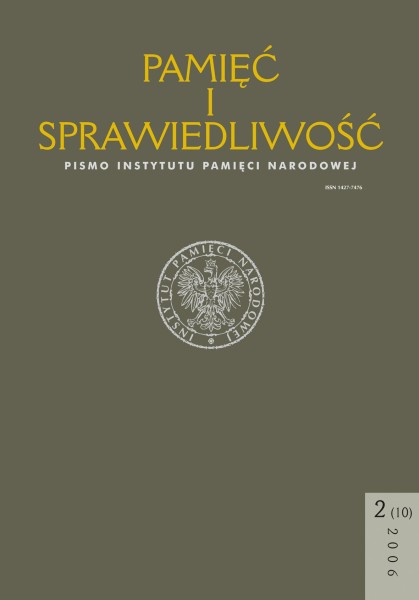Narodowe Siły Zbrojne w PRL i na emigracji w latach 1945–1989 w świetle historiografii, publicystyki, literatury oraz filmu
Pamięć i Sprawiedliwość, Том 10 № 2 (2006), pages: 245-291
Publication date: 2006-12-30
Аннотация
The article presents the picture of National Military Forces (Narodowe Siły Zbrojne – NSZ: Polish right-wing politic and military organisation acting during the WW2 and fighting soviet occupation) in Polish historiography, journalism, literature and film in 1945–1989 in Poland and at the emigration. NSZ has been treated not only as an object of historical researches, but also as an element of the world-view discussion. Communists ruling Poland in 1944–1989 treated the organisation as an enemy, consequently in most of official works written in communist Poland it was criticised, and the truth about it was replaced with misinformation. NSZ soldiers were usually presented as „bandits”, German collaborators, „enemies of the people”, imperialism agents, successors of magnat traditions in Poland, ruthless fanatics: anticommunists and anti-Semites. It should be added, that historical researches on NSZ were often based on incomplete and one-track sources. Many of Polish intellectuals, also activists of democratic opposition in the seventies and the eighties treated NSZ with reluctance, mainly because it was blamed of nationalism and antidemocratic and antiliberal approach. Only at the emigration more free discussion about
NSZ was possible, although it was limited to subjective comments of ex-members of the organisation and their polemics with their opponents. A great contribution to remembering NSZ anticommunist traditions were put by Paris „Kultura” editor-in-chief and co-author of „Zeszyty Literackie” Jerzy Giedroyc. Inspired by him, Zbigniew S. Siemiaszko started researches on NSZ at the emigration and wrote the fi rst monograph about it. The article also mentions ways of describing activities of independence underground, who fought for power with the communists, in Poland before 1989. Moreover, author of the article tries to show emigration and Polish trends of writing and understanding modern history of Poland.
 Język Polski
Język Polski
 English
English
 Deutsch
Deutsch
 Français (France)
Français (France)
 Italiano
Italiano
 Русский
Русский


 PDF (Język Polski)
PDF (Język Polski)
